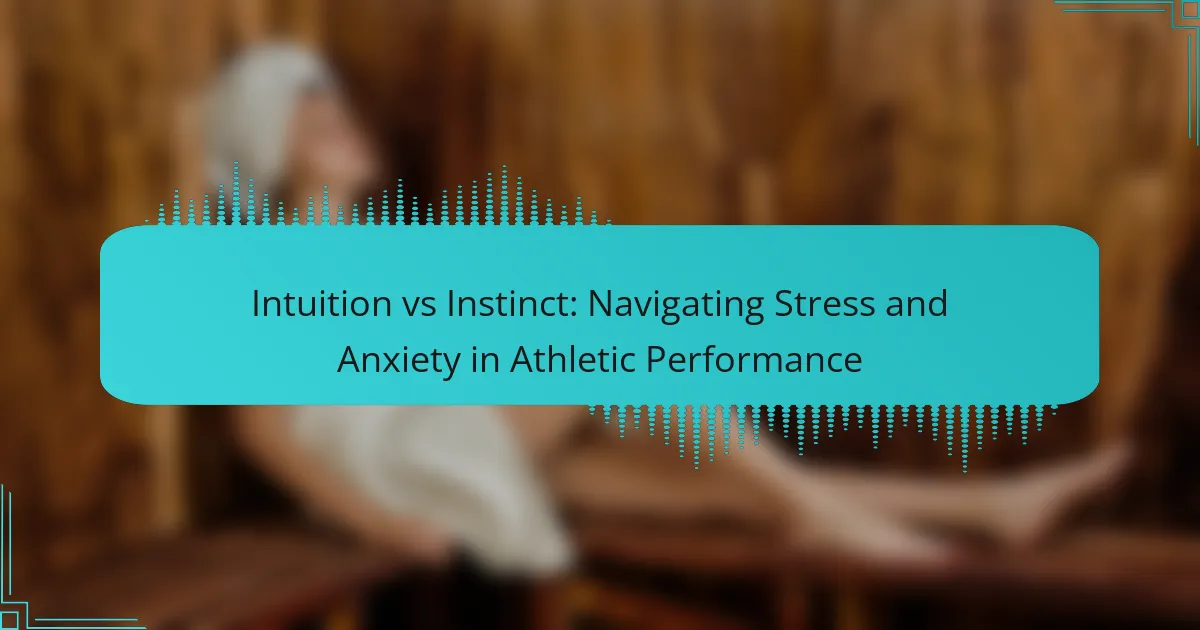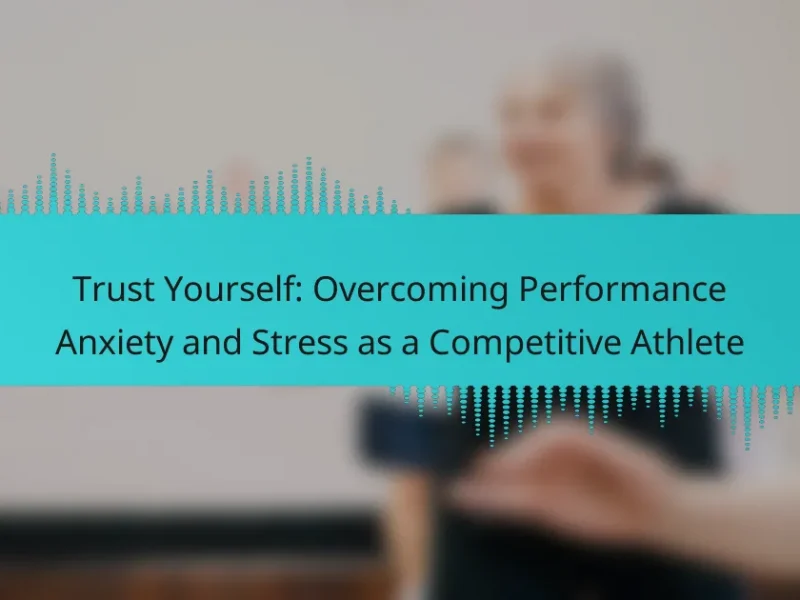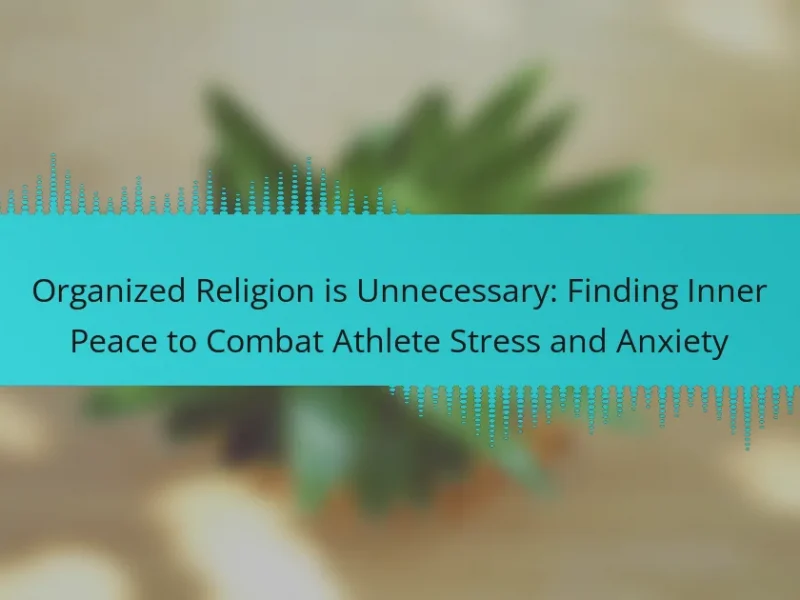Athletes often face stress and anxiety that can impact their performance. Understanding the roles of intuition and instinct can enhance decision-making under pressure. Mindfulness techniques and reflective practices help differentiate these responses. Effective strategies for managing stress include breathing exercises and visualization, fostering resilience and improving focus.
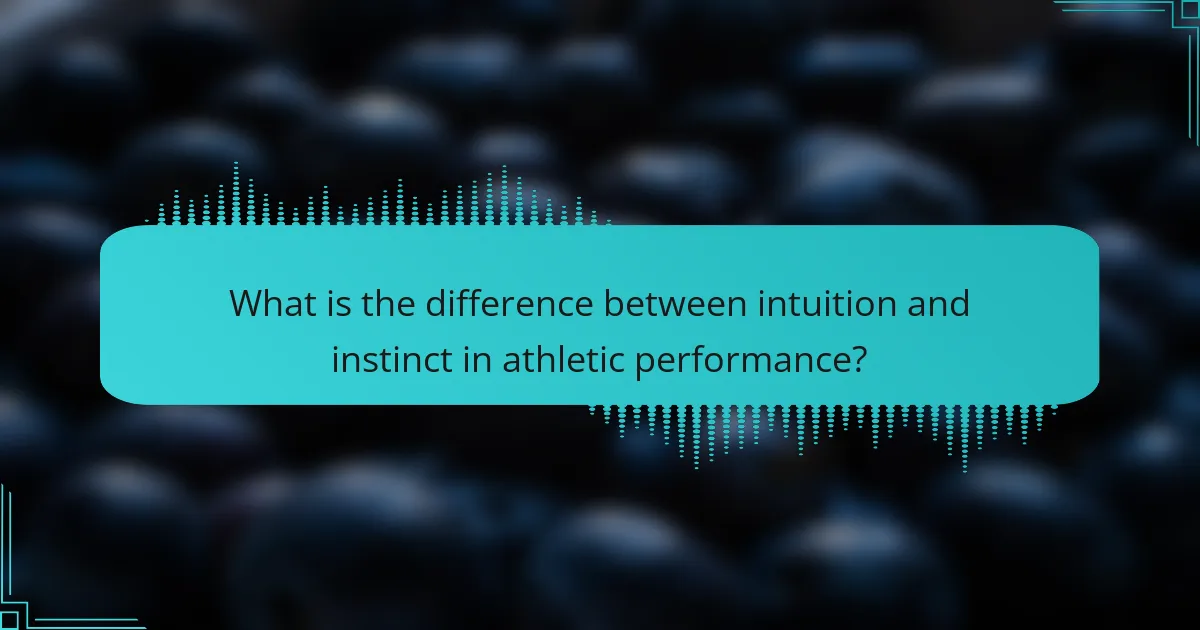
What is the difference between intuition and instinct in athletic performance?
Intuition and instinct both play distinct roles in athletic performance. Intuition involves a deeper cognitive process, often based on experience and knowledge, while instinct is a more primal, automatic response to stimuli. Athletes may rely on intuition to make strategic decisions during competition, whereas instinct often guides immediate reactions to physical challenges. Understanding these differences can enhance performance by optimizing decision-making under stress.
How do intuition and instinct influence decision-making under pressure?
Intuition and instinct significantly guide decision-making under pressure by enabling quick, subconscious responses. Intuition draws from past experiences, allowing athletes to make rapid choices without overthinking. In contrast, instinct is an innate reaction to immediate stimuli, often driven by survival mechanisms. Both can enhance performance, but their effectiveness varies based on the individual’s training and mental state. For athletes, harnessing these elements can lead to improved outcomes in high-stress situations.
What role does experience play in developing intuition as an athlete?
Experience significantly enhances an athlete’s intuition by allowing them to recognize patterns and make quicker decisions under pressure. As athletes engage in various scenarios, they develop a deeper understanding of their sport, which informs their instinctive responses. This experiential learning fosters confidence, enabling athletes to manage stress and anxiety effectively during competition. Over time, accumulated experiences translate into refined intuition, allowing for improved performance in high-stress situations.
What are common scenarios where intuition can guide performance?
Intuition can guide performance in high-pressure situations, decision-making, and training adaptations. Athletes often rely on intuitive insights during competitions when quick judgments are essential. For example, instinctual responses can enhance reaction times and improve tactical choices. Additionally, intuitive feelings about physical readiness can inform training intensity and recovery strategies.
How can athletes cultivate their intuitive skills?
Athletes can cultivate their intuitive skills through focused practice and mental conditioning. Techniques such as mindfulness and visualization enhance awareness and decision-making under stress. Regularly engaging in reflective practices helps athletes recognize patterns in their performance, strengthening their intuitive responses. Additionally, training in varied environments fosters adaptability, further honing intuitive skills.
In what ways does instinct affect an athlete’s response to stress?
Instinct significantly influences an athlete’s response to stress by triggering rapid, automatic reactions. These instinctual responses can enhance performance under pressure by enabling quick decision-making and physical reactions. Athletes often rely on instinct to navigate high-stress situations, allowing them to maintain focus and adapt swiftly. Training can refine these instincts, making them more effective in competitive environments.
What physiological responses are triggered by instinct during competition?
Instinct triggers several physiological responses during competition, including increased heart rate, heightened adrenaline production, and enhanced focus. These responses prepare athletes for immediate action and decision-making, often improving performance. Adrenaline boosts energy levels, while increased heart rate enhances blood flow to muscles, facilitating faster reactions.
How can understanding instinct help in managing anxiety?
Understanding instinct can significantly aid in managing anxiety by enhancing decision-making and promoting calmness. Instinct, as an innate response, allows athletes to react swiftly under pressure, reducing overthinking. This instinctual awareness can help identify stress triggers, enabling proactive coping strategies. Additionally, honing instinct through practice fosters mental resilience, leading to improved performance and lower anxiety levels during competition.
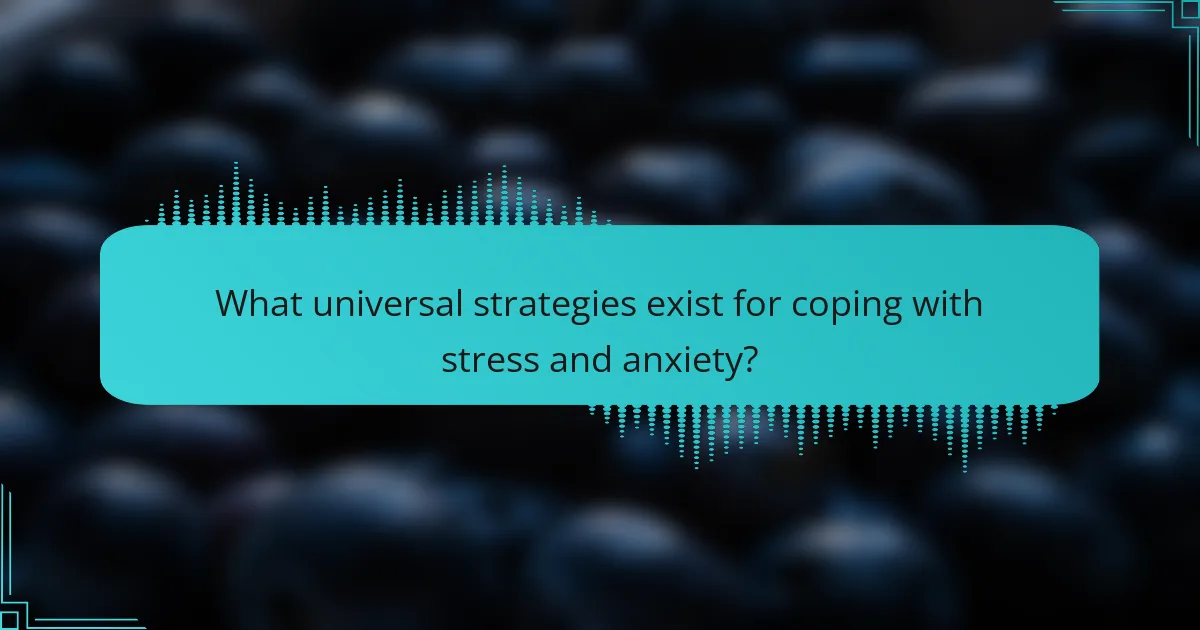
What universal strategies exist for coping with stress and anxiety?
To cope with stress and anxiety in athletic performance, athletes can utilize strategies that enhance intuition and instinct. These strategies include mindfulness techniques, breathing exercises, and visualization practices. Mindfulness promotes awareness of thoughts and emotions, allowing athletes to manage stress effectively. Breathing exercises can reduce physiological symptoms of anxiety, while visualization helps athletes mentally rehearse successful performances. These approaches foster a balanced mental state, enhancing overall performance and resilience.
How can athletes use breathing techniques to enhance focus?
Athletes can enhance focus through breathing techniques by promoting relaxation and reducing anxiety. Controlled breathing increases oxygen flow, stabilizes heart rate, and calms the mind, leading to improved concentration during performance. Techniques like diaphragmatic breathing and box breathing are effective in managing stress, allowing athletes to maintain peak focus under pressure. Regular practice of these techniques can strengthen mental resilience, a unique attribute that differentiates successful athletes in high-stress situations.
What are the benefits of visualization for managing athletic stress?
Visualization effectively reduces athletic stress by enhancing focus and improving performance. It fosters mental clarity, allowing athletes to manage anxiety and build confidence. Research indicates that athletes who practice visualization experience lower stress levels and improved coping strategies. This technique also strengthens the mind-body connection, promoting relaxation and resilience during competition.
How does physical conditioning contribute to mental resilience?
Physical conditioning enhances mental resilience by improving stress management and emotional regulation. Regular physical activity releases endorphins, which reduce anxiety and boost mood. This physiological response cultivates a positive mindset, enabling athletes to cope with performance pressures effectively. Additionally, consistent training develops discipline and focus, reinforcing mental toughness. Ultimately, the connection between physical fitness and mental strength is crucial for navigating stress in athletic performance.
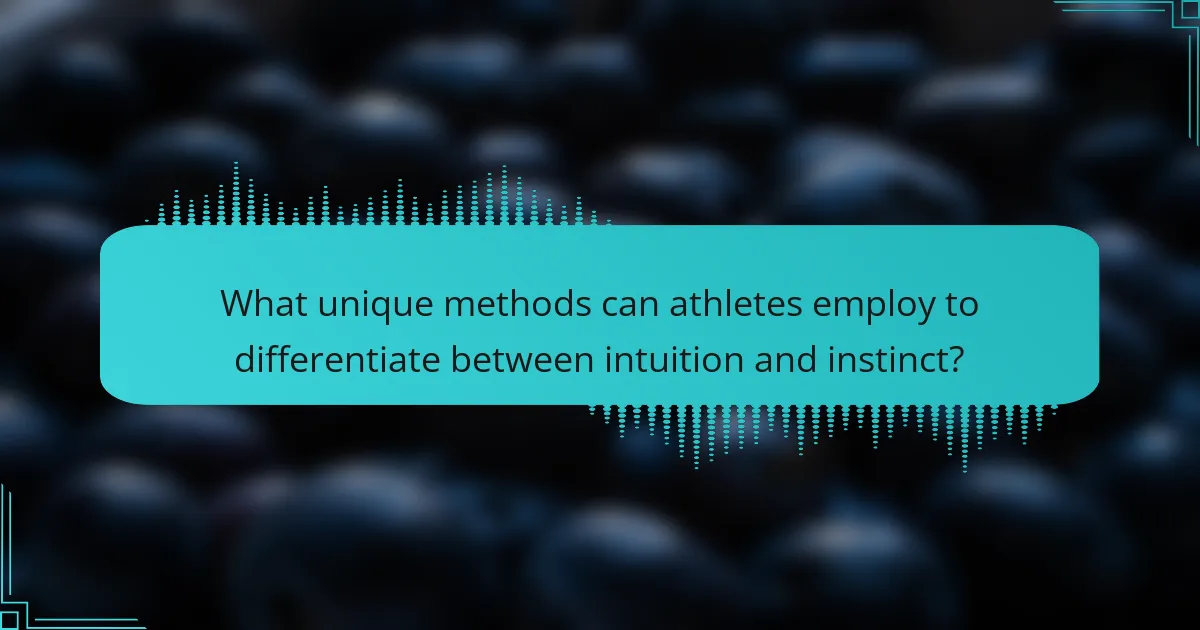
What unique methods can athletes employ to differentiate between intuition and instinct?
Athletes can differentiate between intuition and instinct by using mindfulness techniques and reflective practices. Mindfulness enhances self-awareness, allowing athletes to recognize their immediate reactions versus deeper insights. Reflective practices, such as journaling, help in analyzing past decisions and identifying patterns in thought processes. These methods encourage athletes to develop a clearer understanding of their internal cues, distinguishing instinctual reactions from intuitive guidance.
How can journaling enhance an athlete’s understanding of their instincts?
Journaling enhances an athlete’s understanding of their instincts by promoting self-reflection and awareness. This practice allows athletes to analyze their thoughts and feelings during training and competition. As a result, they can identify patterns in their instinctive responses to stress and anxiety, leading to improved decision-making. Regular journaling cultivates a deeper connection to one’s intuition, ultimately enhancing performance.
What role does mentorship play in developing intuitive skills?
Mentorship significantly enhances the development of intuitive skills in athletes. It provides guidance, feedback, and support, fostering a deeper understanding of one’s instincts. Mentors help athletes recognize patterns and make quick decisions under pressure, which is vital for managing stress and anxiety during performance. Through personalized insights, mentorship cultivates confidence and sharpens intuitive responses, leading to improved athletic outcomes.
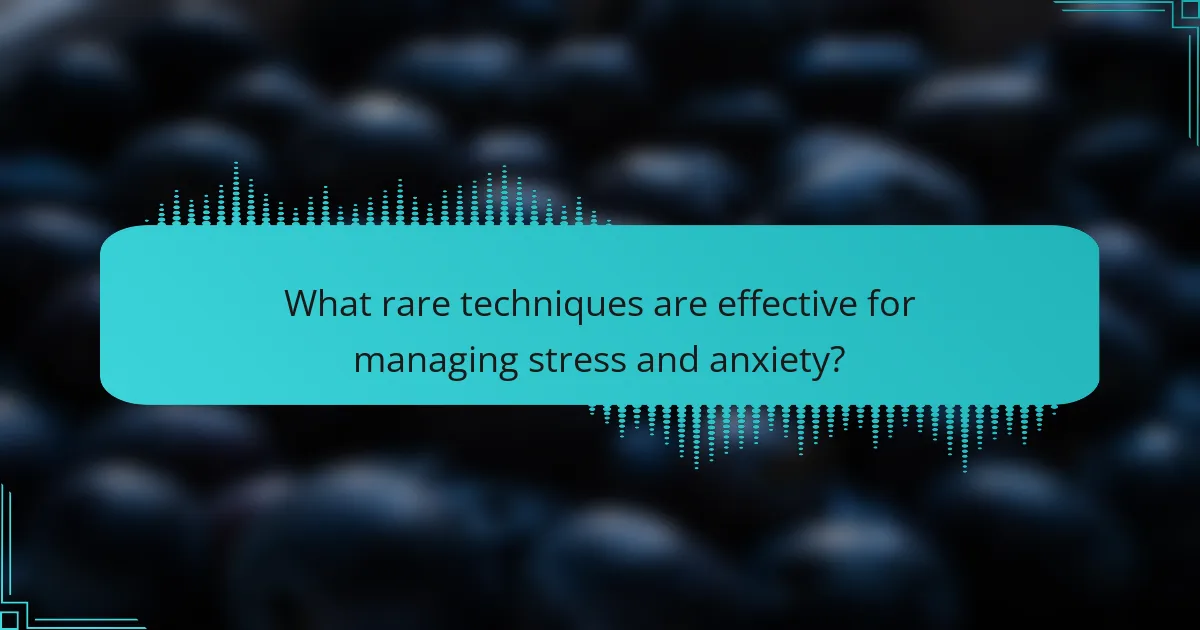
What rare techniques are effective for managing stress and anxiety?
Mindfulness meditation is a rare technique effective for managing stress and anxiety in athletes. This practice enhances self-awareness, allowing athletes to differentiate between intuition and instinct during performance. Research shows that mindfulness can reduce anxiety levels by up to 30%, improving focus and decision-making under pressure. Incorporating breath control exercises further amplifies this effect, fostering a calm state conducive to optimal athletic performance.
How can athletes benefit from biofeedback in performance settings?
Athletes can enhance performance by using biofeedback to manage stress and anxiety effectively. This technology provides real-time data on physiological responses, helping athletes recognize stress triggers and adjust their mental state. As a result, they can improve focus, increase resilience, and optimize performance under pressure. Biofeedback techniques, such as heart rate variability training, have shown unique benefits in reducing anxiety levels, leading to better decision-making during competitions. Regular practice can cultivate a deeper intuition, allowing athletes to instinctively respond to high-pressure situations.
What is the impact of neurofeedback on athletic performance?
Neurofeedback positively impacts athletic performance by enhancing focus and reducing anxiety. This training method helps athletes regulate brain activity, leading to improved mental resilience and decision-making under pressure. Studies show neurofeedback can increase performance metrics by up to 20% in high-stress situations. By fostering better emotional control, athletes can maintain peak performance levels, especially during competition.
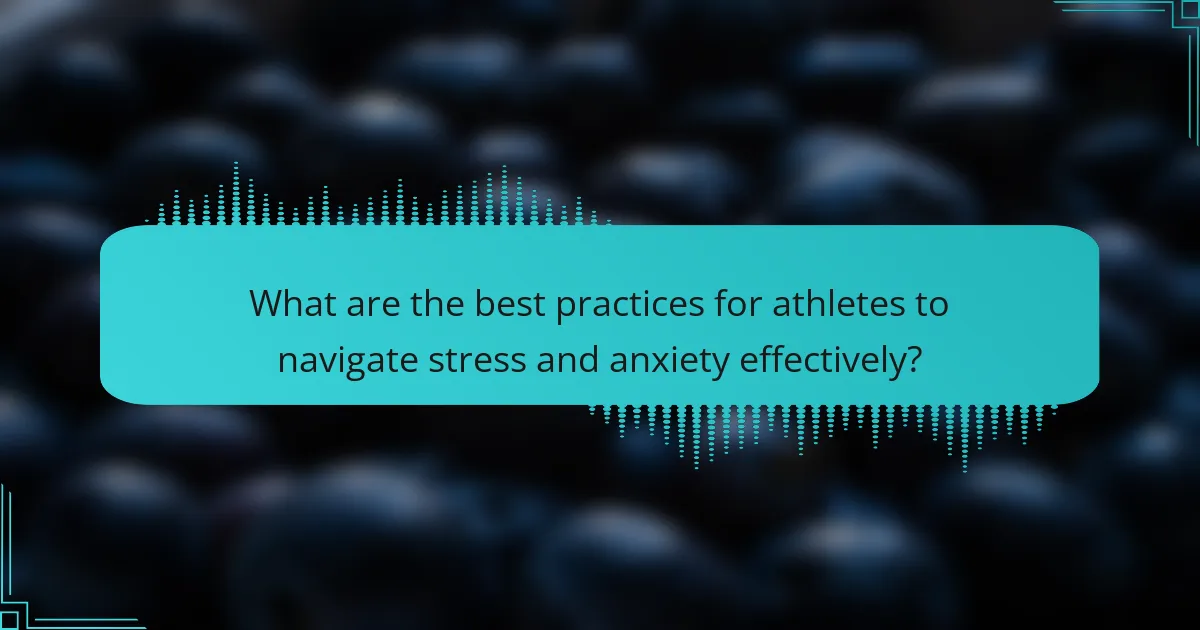
What are the best practices for athletes to navigate stress and anxiety effectively?
Athletes can navigate stress and anxiety effectively by employing mindfulness techniques, establishing routines, and seeking support. Mindfulness practices, such as meditation and breathing exercises, enhance focus and reduce anxiety levels. Developing consistent pre-performance routines helps create a sense of control and predictability. Additionally, engaging with coaches, teammates, or mental health professionals provides valuable support and perspective.
How can athletes create a personalized stress management plan?
Athletes can create a personalized stress management plan by identifying triggers, setting specific goals, and incorporating relaxation techniques. First, assess stressors unique to your sport. Next, establish achievable objectives to manage these stressors. Incorporate methods such as mindfulness, breathing exercises, or visualization to enhance focus and reduce anxiety. Regularly review and adjust the plan to ensure effectiveness and accommodate changing circumstances.
What common mistakes should athletes avoid when coping with anxiety?
Athletes should avoid overthinking, ignoring their feelings, and neglecting self-care when coping with anxiety. Overthinking can lead to performance paralysis, while ignoring feelings prevents effective coping strategies. Neglecting self-care, such as sleep and nutrition, exacerbates anxiety symptoms.
What expert insights can enhance an athlete’s approach to intuition and instinct?
Expert insights can significantly enhance an athlete’s approach to intuition and instinct by fostering mental resilience. Training methods that incorporate mindfulness techniques can improve focus and reduce anxiety, leading to better instinctual decision-making during competition. Cognitive strategies such as visualization help athletes anticipate scenarios, enhancing their intuitive responses. Additionally, understanding the physiological responses to stress can empower athletes to manage anxiety effectively, allowing their instincts to guide performance. Engaging in regular reflection on past performances can also sharpen intuition, as athletes learn to trust their instincts through experience.
